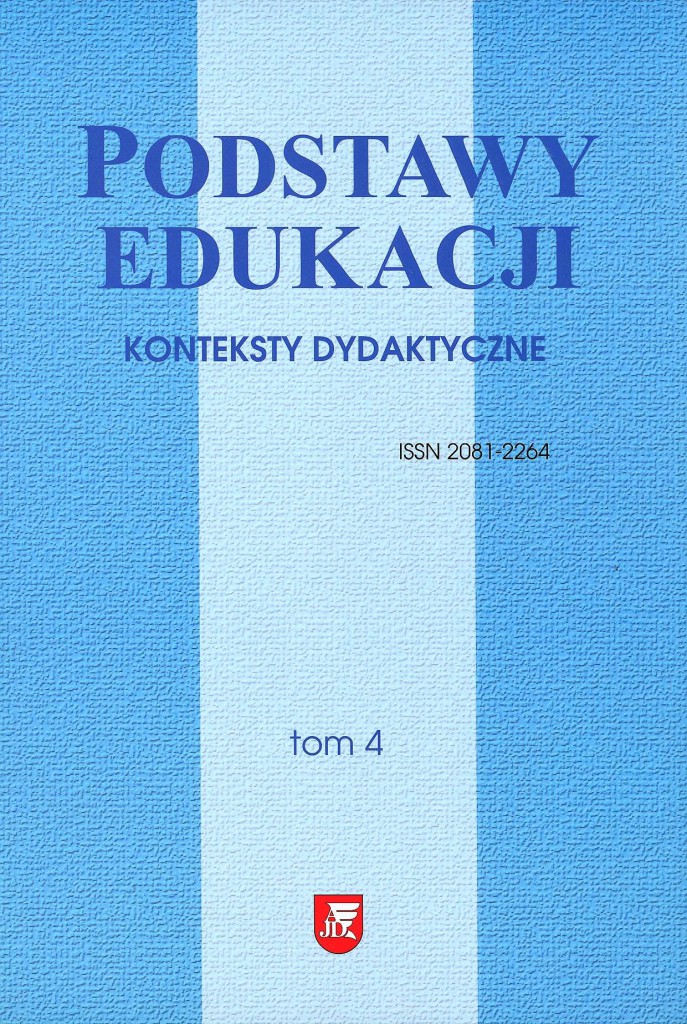Abstrakt
Opracowanie podejmuje tematykę kształcenia przez Internet. Przybliża termin i rozumienie pojęć związanych z kształceniem on-line. Pokazuje, jak zjawisko e-nauczania ewoluowało w minionych czasach. Przedstawia podział e-learningu na kategorie, uwzględniające wykorzystanie nowych technologii. Sygnalizuje temat weryfi kacji wiedzy studenckiej oraz sposób badania efektywności kształcenia opartej na e-nauczaniu. Pokazuje, jakie problemy występują w trakcie tego procesu. Udziela m.in. odpowiedzi na pytanie dotyczące wad tej formy nauczania oraz przyczyn utrudniających rozwój e-nauki w Polsce. W artykule zaproponowano, jak konkurować inaczej lub lepiej z innymi uczelniami, włączając e-learning w system kształcenia.
Bibliografia
Abras, Ch., Ozok, A., Preece, J. (2005). Research Methods for Validating and Deriving Guidelines for E-learning Online Communities. Interactive Technology & Smart Education, 2. http://www.e-mentor.edu.pl/artykul/index/numer/37/ id/788 (06.01.2011).
Alomyan, H. (2004). Individual Differences: Implications for Web-based Learning Design. International Education Journal, 4. http://www.e-mentor.edu.pl/ artykul/index/ numer/37/id/788 (06.01.2011).
Atrakcyjność e-learningu jako formy kształcenia. http://www.ankietka.pl/wynikibadania/53930/atrakcyjnosc-e-learningu-jako-formy-ksztalcenia.%20html (04.02.2011).
Bariera kulturowa. http://pl.wikipedia.org/wiki/Bariera_kulturowa (17.01.2011).
Bizon, W. (2010). Trafność i rzetelność pomiarów poprzedzających badanie efektywności szkoleń e-learningowych. E-mentor, 5(37). http://www.e-mentor. edu.pl/artykul/index/numer /37/id/788 (04.02.2011).
Chien-Hung, L., Tzu-Chiang, Ch., Yueh-Min, H. (2001). Assessment of Effectiveness of Web-based Training on Demand. Interactive Learning Environments, 3. http://www.e-mentor.edu.pl/artykul/index/numer/37/id/788 (06.01.2011).
Chmielewska, K. (2004). Materiały elektroniczne na lekcji. W: Komputer w edukacji. J. Morbitzer (red.). Kraków.
Derfert-Wolf, L. (2005). Information literacy – koncepcje i nauczanie umiejętności informacyjnych. Biuletyn EBIB, 1. http://ebib.oss.wroc.pl/2005/62/derfert.php (4.03.2009).
Drucker, P.F. (1999). Społeczeństwo pokapitalistyczne. G. Kranas (tłum.). Warszawa.
Faure, E. (1975). Uczyć się aby być: raport międzynarodowej komisji do spraw rozwoju edukacji UNESCO. Z. Zakrzewska (tłum.). Warszawa.
Giurko Z., E-learning. http://www.eschool.sonkis.pl/Elearning.pdf (4.03.2009).
Gofron, B. (2010). Nierówności edukacyjne w warunkach radykalnej zmiany społecznej. Częstochowa.
Gregorczyk, S. (2010). E-learning a przewaga konkurencyjna szkoły wyższej. E-mentor, 5(37). http://www.e-mentor.edu.pl/artykul/index/numer/37/ id/787 (4.03.2009).
Hendler, J. Students Outpace Teachers. eLearn Magazine, Education and Technology in Perspective. http://www.elearnmag.org/subpage.cfm?section=articles&a rticle=106-1 (16.01.2011).
Kamińska-Czubała, B. (2001). Nauczanie na odległość w kształceniu akademickim. Konspekt: Pismo Akademii Pedagogicznej w Krakowie, 9. http://www.wsp. krakow.pl/konspekt/ konspekt9/k_czubala.html (06.02.2011).
Law, K.M.Y., Lee, V.C.S., Yu, Y.T. (2010). Learning Motivation in E-learning Facilitated Computer Programming Courses. Computers & Education, 55. http:// www.e-mentor.edu.pl/artykul/index/numer/37/id/788 (06.01.2011).
Łukasik, B. (2009). Od przekazu wiedzy do uczenia samodzielności poznawczej i egzystencjalnej. W: A. Gofron, M. Adamska-Staroń (red.). Podstawy edukacji. Ciągłość i zmiana. Kraków.
Mayer, R.E. Predictions for 2010. eLearn Magazine, Education and Technology in Perspective. http://www.elearnmag.org/subpage.cfm?section=articles& article=106-1 (16.01.2011).
Papert, S. (1993). The Children’s Machine. Nowy Jork.
Papert, S. (1997; ang. wyd. 1980). Burze mózgów. T. Tymosz (tłum.). Warszawa. http://www.e-mentor.edu.pl/artykul/index/numer/28/id/611 (07.02.2011).
Radzicka, J., Stąporek, M. (2010). Distance Education – Alternative Method of Education and Professional Skills Improvement for Librarians and Library Users. II Wrocławskie Spotkania Bibliotekarzy Polonijnych, Wrocław, 18–19.06.2010. http://www.nowyebib.info/publikacje/matkonf/mat20/ radzicka.php#2 (01.02.2011).
Rössling, G., Vellaramkalayil, T. (2009). First Steps Towards a Visualization-Based Computer Science Hypertextbook as a Moodle Module. Electronic Notes in Theoretical Computer Science, 224.
Słownik języka polskiego PWN z zasadami. (2010). Warszawa.
Sołtysiak W. (2011). Wizja studiów telematycznych w opinii studentów wydziału pedagogicznego Akademii im. Jana Długosza w Częstochowie. W: E. Ślachcińska, A. Zdunak (red.). Jakość wobec wyzwań i zagrożeń XXI wieku. Poznań.
Striker, M., Wojtaszczyk, K. (2009). Bariery wdrażania e-learningu na przykładzie uczelni wyższej. E-mentor, 4(31). http://www.e-entor.edu.pl/artykul/index/ numer/31/id/676 (01.02.2011).
Sun, P.-Ch., Tsai, R.J., Finger, G., Chen, Y.-Y., Yeh, D. (2008). What Drives a Successful E-learning? An Empirical Investigation of Critical Factors Infl uencing Learner Satisfaction. Computers & Education, 50. http://www.e-mentor.edu. pl/artykul/index/numer/37/id/788 (06.01.2011).
Sysło M.M. (red.) (2003). Sześć scenariuszy dotyczących przyszłości szkoły. W: Informatyka w szkole. XIX konferencja. Szczecin – Wrocław.
Sysło M.M. (2004a). Model rozwoju kompetencji informatycznych. W: W. Strykowski, W. Skrzydlewski (red.). Kompetencje medialne społeczeństwa wiedzy. Materiały z V Konferencji „Media w Edukacji”. Poznań.
Sysło, M.M. (2004b). Model rozwoju technologii informacyjnej w edukacji. W: Informatyka w szkole. XX konferencja. Wrocław.
Sysło, M.M. (2009). E-learning w szkole. E-mentor, 1(28). http://www.e-mentor. edu.pl/artykul/index/numer/28/id/611 (07.02.2011).
Szpunar, M. (2006). Internet a nowoczesna eduk@cja – czy istnieje jakaś alternatywa? Zeszyty Naukowe. Świętokrzyskie Centrum Edukacji na Odległość, 2. http:// www.magdalenaszpunar.com/_publikacje/2006/internet_a_nowoczesna_ edukacja.pdf (4.03.2009).
UNESCO (2002). Information and Communication Technology in Education. A Curriculum for Schools and Programme of Teacher Development. Paryż.
Wojciechowski, P. (2010). E-sprawdziany – argumenty za i przeciw. E-mentor, 5(37). http://www.e-mentor.edu.pl/artykul/index/numer/37/id/789 (01.02.2011).
Mam świadomość, że czasopismo jest wydawane na licencji Creative Commons - Uznanie autorstwa (https://creativecommons.org/licenses/by/4.0/legalcode).
Przesyłając artykuł wyrażam zgodę na jego udostępnienie na tej licencji.

